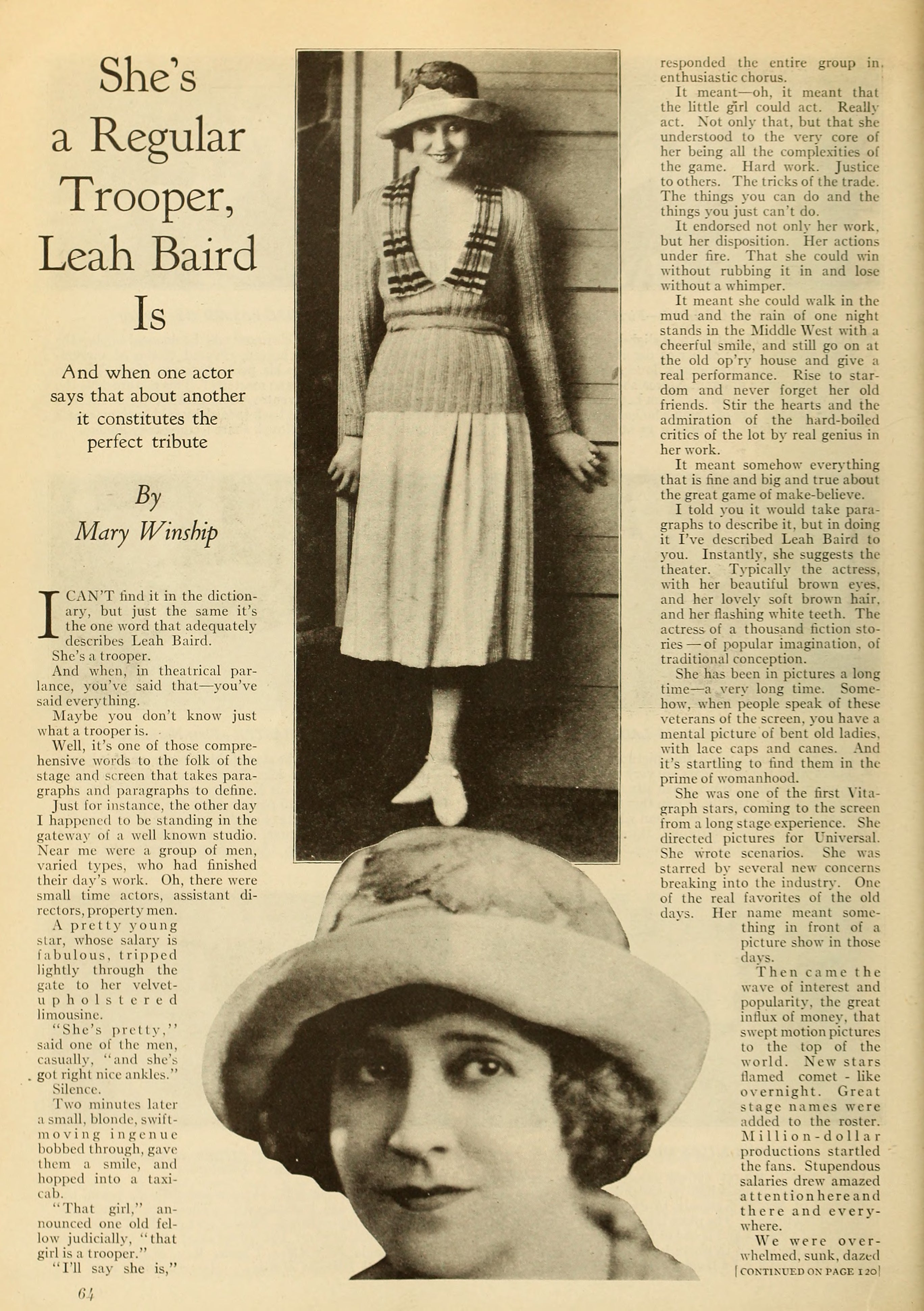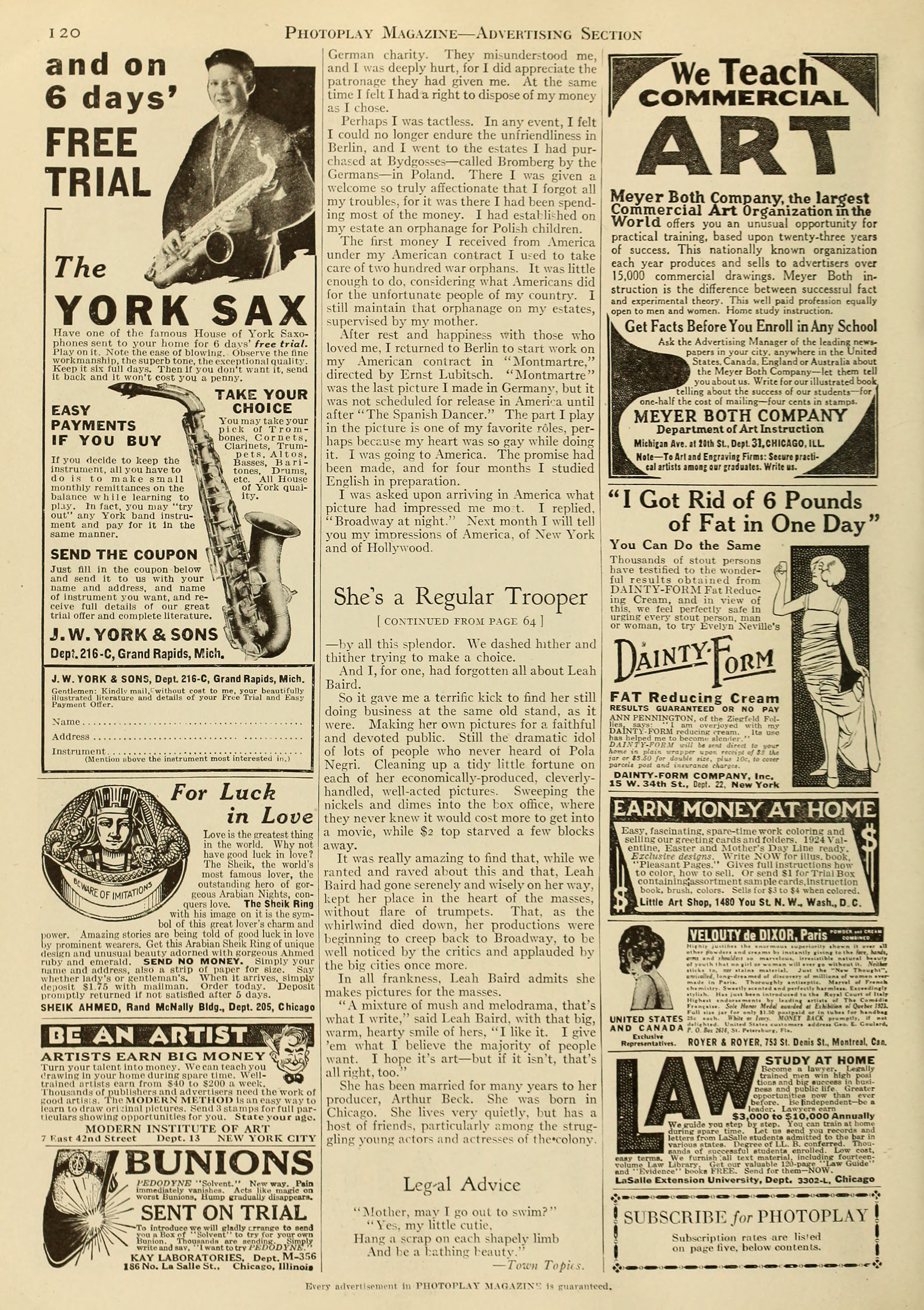Leah Baird — She’s a Regular Trooper, Leah Baird is (1924) 🇺🇸

I can’t find it in the dictionary, but just the same it’s the one word that adequately describes Leah Baird.
by Mary Winship
She’s a trooper.
And when, in theatrical parlance, you’ve said that — you’ve said everything.
Maybe you don’t know just what a trooper is.
Well, it’s one of those comprehensive words to the folk of the stage and screen that takes paragraphs and paragraphs to define.
Just for instance, the other day I happened to be standing in the gateway of a well-known studio. Near me were a group of men, varied types, who had finished their day’s work. Oh, there were small time actors, assistant directors, property men.
A pretty young star, whose salary is fabulous, tripped lightly through the gate to her velvet-upholstered limousine.
“She’s pretty,” said one of the men, casually, “and she’s got right nice ankles.”
Silence.
Two minutes later a small, blonde, swift-moving ingénue bobbed through, gave them a smile, and bopped into a taxicab.
“That girl,” announced one old fellow judicially, “that girl is a trooper.”
“I’ll say she is,” responded the entire group in enthusiastic chorus.
It meant — oh, it meant that the little girl could act. Really act. Not only that, but that she understood to the very core of her being all the complexities of the game. Hard work. Justice to others. The tricks of the trade. The things you can do and the things you just can’t do.
It endorsed not only her work, but her disposition. Her actions under fire. That she could win without rubbing it in and lose without a whimper.
It meant she could walk in the mud and the rain of one night stands in the Middle West with a cheerful smile, and still go on at the old op’ry house and give a real performance. Rise to stardom and never forget her old friends. Stir the hearts and the admiration of the hard-boiled critics of the lot by real genius in her work.
It meant somehow everything that is tine and big and true about the great game of make-believe.
I told you it would take paragraphs to describe it, but in doing it I’ve described Leah Baird to you. Instantly, she suggests the theater. Typically the actress, with her beautiful brown eyes, and her lovely soft brown hair, and her flashing white teeth. The actress of a thousand fiction stories — of popular imagination, of traditional conception.
She has been in pictures a long time — a very long time. Somehow, when people speak of these veterans of the screen, you have a mental picture of bent old ladies, with lace caps and canes. And it’s startling to find them in the prime of womanhood.
She was one of the first Vitagraph stars, coming to the screen from a long stage experience. She directed pictures for Universal. She wrote scenarios. She was starred by several new concerns breaking into the industry. One of the real favorites of the old days. Her name meant something in front of a picture show in those days.
Then came the wave of interest and popularity, the great influx of money, that swept motion pictures to the top of the world. New stars flamed comet-like overnight. Great stage names were added to the roster. Million-dollar productions startled the fans. Stupendous salaries drew amazed attention here and there and everywhere.
We were overwhelmed, sunk, dazed — by all this splendor. We dashed hither and thither trying to make a choice.
And I, for one, had forgotten all about Leah Baird.
So it gave me a terrific kick to find her still doing business at the same old stand, as it were. Making her own pictures for a faithful and devoted public. Still the dramatic idol of lots of people who never heard of Pola Negri. Cleaning up a tidy little fortune on each of her economically-produced, cleverly-handled, well-acted pictures. Sweeping the nickels and dimes into the box office, where they never knew it would cost more to get into a movie, while $2 top starved a few blocks away.
It was really amazing to find that, while we ranted and raved about this and that. Leah Baird had gone serenely and wisely on her way. kept her place in the heart of the masses, without flare of trumpets. That, as the whirlwind died down, her productions were beginning to creep back to Broadway, to be well noticed by the critics and applauded by the big Cities once more.
In all frankness. Leah Baird admits she makes pictures for the masses.
“A mixture of mush and melodrama, that’s what I write,” said Leah Baird, with that big, warm, hearty smile of hers. “I like it. I give ‘em what I believe the majority of people want. I hope it’s art — but if it isn’t, that’s all right, too.”
She has been married for many years to her producer, Arthur Beck. She was born in Chicago. She lives very quietly, but has a host of friends, particularly among the struggling young actors and actresses of the colony.


Collection: Photoplay Magazine, March 1924
